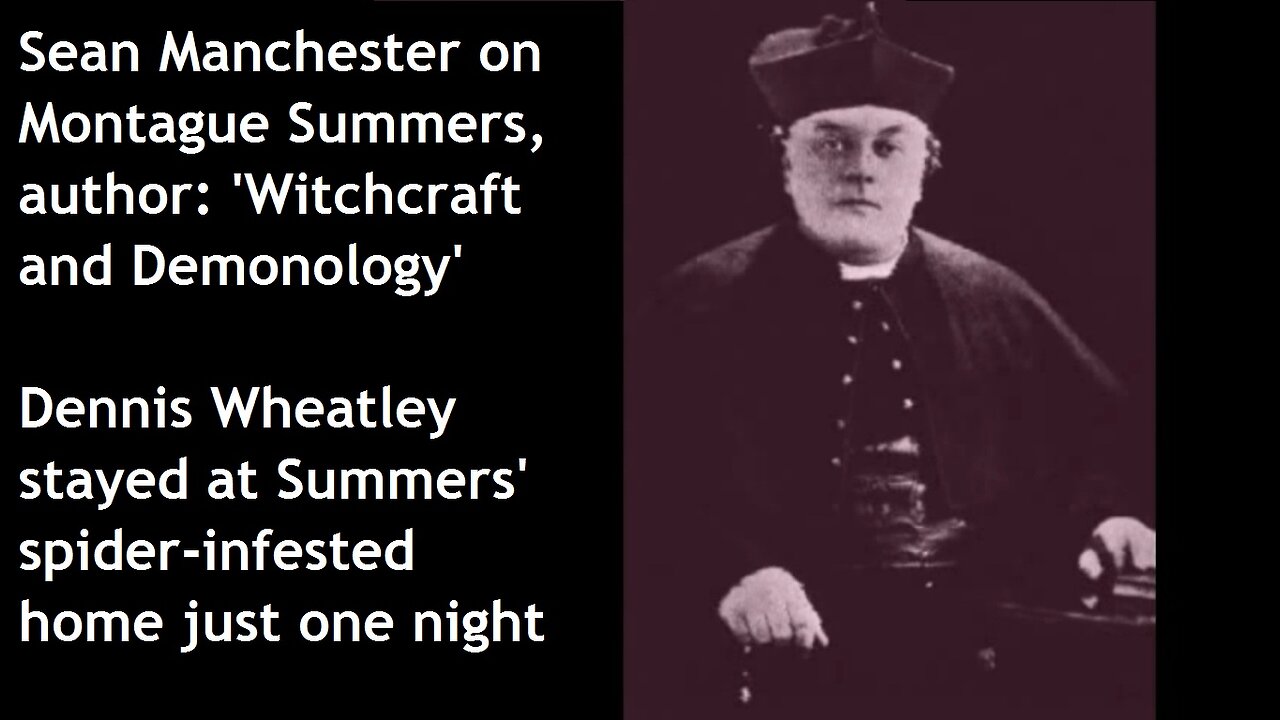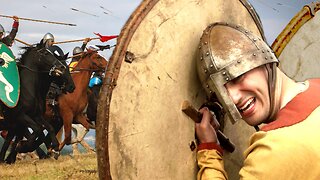Premium Only Content

Illuminati Vampires: 90/115 Anglican Bishops Don't Believe In God, Sean Manchester, Montague Summers
Illuminati Vampires: 90 Anglican Bishops Don't Believe In God Sean Manchester Montague Summers
Bishop (Religious Leadership Title) | Right Reverend | Religion (Literary Genre) | Anglican Ministry | Sean Manchester | Apostasy
Published on Sep 30, 2013
Alphonsus Joseph-Mary Augustus Montague Summers (1880-1948) was a fascinating character without whom vampire research would be very much the poorer. Throughout his life he was described by acquaintances as kind, courteous, generous and outrageously witty; but those who knew him well sensed an underlying discomfort and mystery. In appearance he was plump, round cheeked and generally smiling. His dress resembled that of an eighteenth century cleric, with a few added flourishes such as a silver-topped cane depicting Leda being ravished by Zeus in the form of a swan. He wore sweeping black capes crowned by a curious hairstyle of his own devising which led many to assume he wore a wig. His voice was high pitched, comical and often in complete contrast to the macabre tales he was in the habit of recounting. Throughout his life he astonished people with his knowledge of esoteric and unsettling occult lore. Many people later described him as the most extraordinary person they had ever known. His successor in the annals of professional vampirology, and founder of the Vampire Research Society, was barely an infant when Summers died. Curiously, Seán Manchester (whose initials are the same as Montague Summers' initials reversed) began in the Church of England and converted to Roman Catholicism before entering holy orders in the Old Catholic Church ~ as, of course, did Summers. Both were ordained within the context of the One Holy Catholic and Apostolic Church and, as Old Catholic Bishops, led autocephalous jurisdictions that held authority in Great Britain. Summers entered the Old Catholic priesthood in 1913 and, towards the end of his life, was elevated to the episcopate by Hugh George de Willmott Newman, Archbishop of Glastonbury ~ an office and See currently held by Seán Manchester. Summers was episcopally consecrated for the Order of Corporate Reunion.
http://radio4all.net/index.php/program/57692
For a living, Summers was able to draw on a modest legacy from his father, supplemented by spells of teaching at various schools, including Hertford Grammar, the Central School of Arts and Crafts in Holborn, and Brockley School in south London where he was senior English and Classics Master. He described teaching as: "One of the most difficult and depressing of trades, and so in some measure it must have been even well-nigh three hundred years ago when boys were not nearly so stupid as they are today." In practice though, he was both entertaining and effective as a teacher once he had overcome initial problems with discipline, and was popular with both pupils and colleagues despite making it plain his real interests lay elsewhere.
From 1926, when he was in his mid-forties, Summers' writings and editing earned him the freedom to pursue full time his many enthusiasms and love of travel, particularly in Italy. The bulk of his activity then was related to English Restoration drama of the seventeenth century. Beginning in 1914 with the Shakespeare Head Press, Summers had edited a large number of Restoration plays for various publishers, accompanied by lengthy critical introductions that were highly praised in their own right, and did much to rescue that period of literature from oblivion.
Not content with editing and introducing these plays, Summers helped in 1919 to found the Phoenix Society whose aim was to present them on stage in London. The venture was an immediate success and Summers threw himself wholeheartedly and popularly into all aspects of the productions, which were staged at various theatres. This brought him a measure of fame in London society and invitations to the most select salons, which he dazzled with his wit and erudition. By 1926 he was recognized as the greatest living authority on Restoration drama. Some ten years later he crystallized his knowledge in The Restoration Theatre and The Playhouse of Pepys which examined almost every possible aspect of the London stage between 1660 and 1710.
http://www.gothicpress.freeserve.co.uk/Montague%20Summers.htm
-
 LIVE
LIVE
Game On!
12 hours agoPresident Trump TAKES OVER the Daytona 500!
405 watching -
 21:35
21:35
DeVory Darkins
3 days ago $10.03 earnedMitch McConnell TORCHED as Secretary of HHS is sworn in
46.3K130 -
 1:20:04
1:20:04
Tim Pool
4 days agoGame of Money
108K11 -
 2:21:11
2:21:11
Nerdrotic
15 hours ago $31.95 earnedDown the Rabbit Hole with Kurt Metzger | Forbidden Frontier #090
145K25 -
 2:41:13
2:41:13
vivafrei
20 hours agoEp. 251: Bogus Social Security Payments? DOGE Lawsduit W's! Maddow Defamation! & MORE! Viva & Barnes
262K290 -
 1:19:23
1:19:23
Josh Pate's College Football Show
13 hours ago $4.78 earnedBig Ten Program Rankings | What Is College Football? | Clemson Rage| Stadiums I Haven’t Experienced
72.7K1 -
 13:22:09
13:22:09
Vigilant News Network
19 hours agoBombshell Study Reveals Where the COVID Vaccine Deaths Are Hiding | Media Blackout
116K58 -
 1:17:59
1:17:59
Sarah Westall
14 hours agoDOGE: Crime & Hysteria bringing the Critics & the Fearful - Plus new CDC/Ukraine Crime w/ Dr Fleming
99.7K13 -
 45:39
45:39
Survive History
20 hours ago $10.98 earnedCould You Survive in the Shield Wall at the Battle of Hastings?
88.9K7 -
 1:50:28
1:50:28
TheDozenPodcast
19 hours agoViolence, Abuse, Jail, Reform: Michael Maisey
119K6